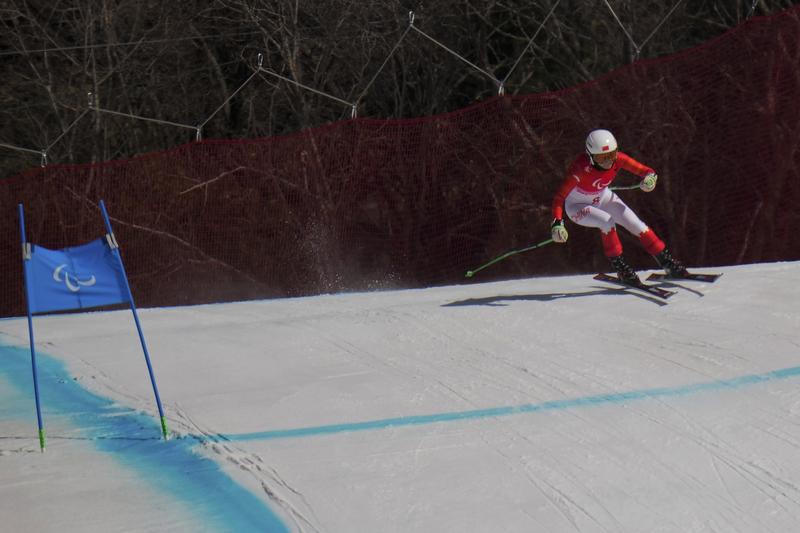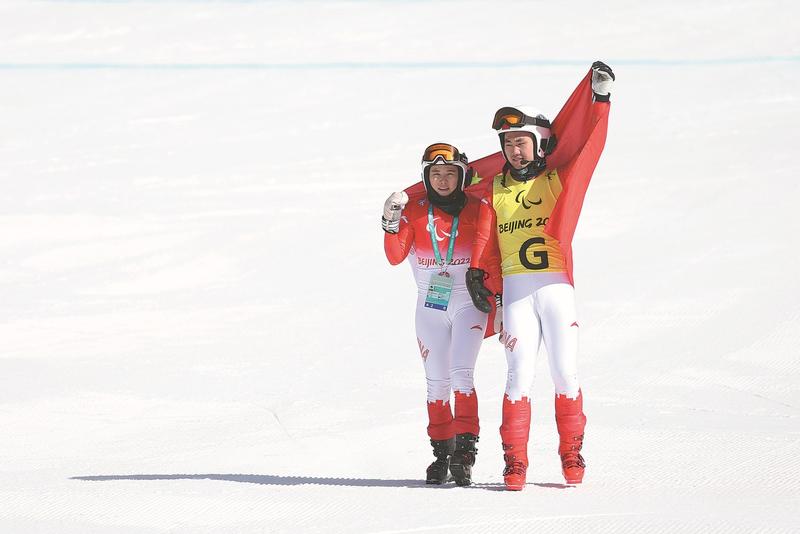 Zhu Daqing of China competes in the women's super-G, vision impaired, at the 2022 Winter Paralympics, March 6, 2022, in the Yanqing district of Beijing. (ANDY WONG / AP)
Zhu Daqing of China competes in the women's super-G, vision impaired, at the 2022 Winter Paralympics, March 6, 2022, in the Yanqing district of Beijing. (ANDY WONG / AP)
After crossing the finish line of the women's downhill vision-impaired race on Saturday, Zhu Daqing grimaced in pain and put one hand to her chest-evidence of the injury she sustained in a high-speed training run crash just days before at the National Alpine Skiing Centre in Beijing's Yanqing district.
Zhu's bravery yielded a silver-China's first-ever Paralympic medal in para Alpine skiing. On Sunday, Chinese skier Zhang Mengqiu wrote more history by clinching China's first Paralympic gold in Alpine skiing with victory in the women's super-G standing race.
"I am grateful to my country and our leaders for building such a platform so that we have the chance to perform better. I am just super excited right now," said the 32-year-old, who on Sunday claimed bronze in the women's Super-G VI.
"We have prepared for so long. Our coaches, support staff, and others have put so much into this," Zhu said. "I regard every race as my training. You reap what you sow."
Zhu Daqing, who has congenital amblyopia, took up competitive sports in 2003. As a former sprinter, she won bronze in T12 200m at the 2012 Paralympic Games in London
Zhu, who has congenital amblyopia, took up competitive sports in 2003. As a former sprinter, she won bronze in T12 200m at the 2012 Paralympic Games in London. In 2008, she missed the Beijing Paralympics because of her worsening vision.
Now she has found a new lease of life in Alpine skiing.
ALSO READ: Skier Liang Jingyi bags China's sixth gold medal at Paralympics
"I started to practice Alpine skiing three years ago. I deeply love competitive sports and don't want to leave this stage," she said.
Zhu believes her impairment has actually helped her avoid the fear of speeding downhill that can afflict some people on the slopes.
"When I started training, because I could not see the obstacles and the trail clearly, I had no problem with the speed," she said.
That doesn't mean, of course, that what Zhu does is not dangerous-as a tumble she took in her opening training run on Thursday illustrated.
"The sunlight was so strong that I suddenly lost my sight and hit the protective barrier at a speed of 120 kilometers per hour," she said.
"Because it is difficult for me to lock onto the target, I need to cooperate with my 'eyes', that is my leading skier," she added.
 Zhu Daqing (left) and guide Yan Hanhan celebrate finishing second in the women's downhill vision-impaired category on Saturday at the National Alpine Skiing Centre. (FENG YONGBIN / CHINA DAILY)
Zhu Daqing (left) and guide Yan Hanhan celebrate finishing second in the women's downhill vision-impaired category on Saturday at the National Alpine Skiing Centre. (FENG YONGBIN / CHINA DAILY)
Zhu is guided down the slopes by the 23-year-old Yan Hanhan, a former Team China Alpine skier.
The two have such a good connection, that Zhu says Yan deserves half the credit for the medal.
"We talk through the headset, and I describe the route for her in front, keeping a consistent distance between us, observing and ensuring that she can slide down smoothly," Yan said.
"Through years of cooperation we have developed a very tacit understanding," he added. "I have also been impressed by her toughness and resilience, and her determination to keep training even after her injury."
READ MORE: China's Guo wins Para biathlon women's sprint standing gold
The self-effacing Zhu was keen to play down her heroic effort. "I believe that confronting difficulties is much easier than confronting regrets," she said.
"We hope to represent China's 1.4 billion people and 85 million people with disabilities. Standing at the start gate at the Winter Paralympics is a great honor for us already," she said.
Zhu will go for more glory over the coming days-in the women's slalom, giant slalom, and super combined.


